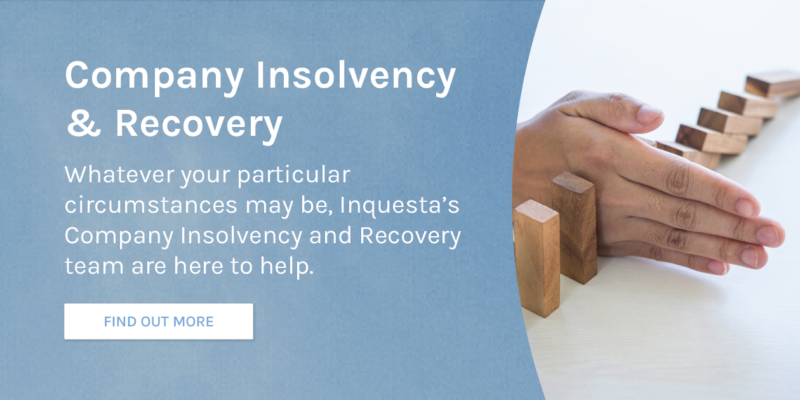The process to write off directors loan accounts (DLA) may not be well-known. However, for businesses navigating financial challenges, it can be pivotal. This blog will unravel the intricacies surrounding DLA write offs, shed light on what it entails, when it is needed, and the implication it can have on all of the parties involved.
If you’re contemplating embarking on this complex process, understanding its significance and the potential impact on your organisation’s financial health is crucial. Read on and learn more about navigating directors loan account write-offs effectively and safely.
What is a Directors Loan Account Write Off?
A directors loan account write off is a legal process through which a business formally acknowledges that a loan owed to (or from) a director cannot be repaid and will, therefore, be written off as bad debt. Writing off will typically involve recording the outstanding loan as an expense on the balance sheet, thereby reducing the company’s net assets.
It’s important to note that the DLA write off amount should be included in the directors self assessment tax returns under the ‘additional information’ pages. From an income tax perspective, the written-off loan is treated as a dividend, which may result in some liability for the director. It’s also crucial that you be aware that the company will be unable to claim any corporation tax relief on the write off amount.
Additionally, it’s vital to emphasise that writing off the directors loan account involves a structured and well-documented legal process, which must be carried out in complete compliance with all relevant insolvency laws and standards. Therefore, you can’t simply agree to not collect on the outstanding balance as this would be deemed insufficient, and would not result in a proper write off. The liability would subsequently remain outstanding until the due process was followed correctly and to the letter of the law. 
When is Writing Off Directors Loan Accounts Possible?
The most common scenario to write off a directors loan account is when insolvency (for either the company or the director) renders the loan unrecoverable. Additionally, writing off a DLA can also occur when mandated by the courts, a director departs, , or if the director and business had a mutual agreement to extinguish outstanding debt.
The most common scenarios where a directors loan account debt will be forgiven are:
- Director Insolvency: If a director becomes insolvent while owing the company money, it can quickly become evident to all parties that they will no longer be able to repay the debt. In this scenario, the business may agree to write off the directors loan account.
- Company Insolvency: When a company is in the process of liquidation/winding up operations, outstanding directors’ loans may not be repayable due to insufficient funds. These loans may be written off as part of the formal process of liquidation.
- Court Order: In some scenarios, the court may issue an order forcing the writing off of a DLA. This is most common when it is deemed to be a necessary part of the firm’s insolvency proceedings.
- Director Resignation/Death: When a director of a business resigns or passes away, the company may determine that the loan owed from (or to) that director is either unlikely or unable to be repaid, potentially leading them to choose to write it off.
- Mutual Agreement in Place: Likely the rarest scenario to write off a directors loan account. There can be a mutual agreement in place between a company and the directors stating that loans will be written off.
Directors Loan Account Write Off: 7 Tips
Managing a potential directors loan account write off is an important aspect of corporate financial management, one that is often undertaken in ‘crisis situations’ of insolvency, financial distress, change in leadership, etc. This process demands careful planning and compliance with requirements. Factors to consider when navigating loan account write offs effectively include:
Seek Professional Advice as Soon as Possible
When faced with the need for a directors loan account write off, it’s imperative that you seek professional guidance immediately. Engaging an insolvency expert or alternative legal advisor is crucial to navigate the intricate landscape of insolvency law.
Experts in the subject will be able to provide you with invaluable insights, knowledge, and experience. All of these factors can come together to ensure that you adhere to the proper process and do not inadvertently violate any legal requirements and leave yourself vulnerable.
Their expertise will help you to make well-informed decisions when it comes to your DLA writeoff — ensuring you stay on the right course from the outset and throughout.
Document Any and All Transactions
Maintaining meticulous and all-encompassing records of financial transactions with regards to the directors loan account is a vital foundational step towards writing off.
Every single transaction, involving a loan from the company to the director (or vice versa), must be documented. These records will serve as a critical source of evidence to support the transparency and legality of the process.
The more accurate and comprehensive your documentation is, the more credible your financial reporting will become.
Assess the Firm’s Financial Position
Before beginning the DLA write off process, it is essential that you conduct a thorough assessment of the company in question’s financial situation.
While insolvency is the most common cause of a write off, it is important to consider if there could be alternative solutions that could help bring the business back from the dead. Primary methods that could help you include:
Consider a comprehensive evaluation of the financial health of your company and make sure that writing off a directors loan account is the most appropriate course of action given the circumstances of the business.

Don’t Forget About Creditors
While the need to write off a directors loan account will often be driven by a company’s financial issues, it is paramount that you consider the interests of the business’s creditors. Creditors will often have a significant stake in a financially struggling firm, and their consent/approval may be required during the insolvency process.
It is important that writing off a directors loan account is done in a manner that totally aligns with the best interests of all stakeholders, including anybody to whom the company in question owes money.
Ensure Legal Compliance
Compliance with legal and regulatory requirements should be viewed as a non-negotiable aspect of the DLA write off process. This should include adhering to all insolvency laws and any other relevant regulations.
Failing to comply can lead to legal challenges, financial penalties, or even the potential for personal liability. To avoid these outcomes make sure that you have a clear and comprehensive understanding of the legal process surrounding directors loan account write-offs in your region and industry.
Consider All Tax Implications
Another key aspect in the write off process is to understand the potential tax implications for all parties involved. Writing off a directors loan account can have tax implications that could affect both the company’s financial position and the directors own tax liability.
Navigating these complexities effectively will usually require the assistance of a qualified tax expert, somebody who will be able to provide guidance on managing the tax aspects of the write off.
Remain Transparent and Accountable
Transparency and accountability are essential principles in the DLA write off process. Maintaining transparency ensures that all stakeholders, including creditors, regulators, and shareholders, can understand and verify the legitimacy of the write off.
Transparency and accountability will not only build trust between parties, but can also protect the company and directors from potential legal and financial troubles that can arise if the process is not completed properly.
Frequently Asked Questions About Writing Off Directors Loan Accounts
We understand that the process to write off directors’ loan accounts can feel complex. So if you still have questions, you won’t be alone. Even experienced directors sometimes find this topic confusing. To help, we’ve put together a list of frequently asked questions to address a selection of common concerns. If you need any further assistance, our team is always here to help.
-
What is a Directors Loan Account?
The purpose of a directors’ loan account is to track the money a director has borrowed from, or lends to, their company. It will include transactions such as personal expenses paid by the company or any cash withdrawals made from company coffers. Proper management is essential to avoid potential tax issues or personal liability.
-
What are the Tax Implications When You Write Off a Directors Loan Account?
The tax implications of writing off a directors’ loan account are twofold: there is income tax for the director (to be treated as a benefit) and corporation tax for the business (if the loan is waived). Always consult with an expert if you want to understand the specific implications of your circumstances.
💡 From an Expert Insolvency Practitioner
Steven Wiseglass
Director | Licensed Insolvency Practitioner
Founder, Inquesta | 10+ years in practice | Fellow of R3 | Member, R3 North West Committee
“One thing directors consistently underestimate is the tax hit from a DLA write-off. Plenty will pick up the phone thinking they’re just dealing with a paperwork exercise, then their face drops when we calculate the personal tax liability. The written-off loan gets treated as income — and we’re often talking £15,000, £25,000, sometimes significantly more depending on the balance. What makes this particularly painful is that proper planning can sometimes reduce this liability substantially, but only if we’re involved before the write-off happens. Once it’s done, you’re locked in.”
-
What Happens if a Directors Loan Account Isn’t Repaid?
If directors’ loan accounts are not repaid, the director may be left facing personal liability, legal action, or even disqualification. HMRC may also look to treat the unpaid amount as a taxable benefit. This could lead to additional penalties or interest being added.
-
Can a Directors Loan Account Be Written Off if the Company is Insolvent?
If the company is insolvent, the process to write off directors’ loan accounts becomes more complex. The insolvency practitioner will assess the situation and the loan may be treated as an asset of the company. If you’re insolvent, it’s imperative that you seek professional advice to safely navigate this process.
-
How Should I Record a Write Off in a Directors Loan Account?
To record a write off of a directors’ loan account, debit the account and credit the company profit and loss account. This will accurately reflect the ‘loss’ in the business’s financial statements. Consider consulting with your accountant to ensure full compliance with accounting standards before committing down one path.
-
Are There Alternatives to Writing Off a Directors Loan Account?
Yes, alternatives to writing off directors’ loan accounts include the creation of a repayment plan, converting your loan into shares, or offsetting it against dividends. Each option will come with different implications for the director, so professional advice is recommended to ensure you’re choosing the best solution.
Don’t Navigate Directors Loan Account Write Offs Alone
As you’ve read and learnt more about the intricacies of the process to write off directors loan accounts, you’ll likely have realised that it’s multifaceted and requires careful planning. You’re required to maintain meticulous documentation and attention to detail, alongside unwavering compliance with all legal standards and regulations.
At Inquesta, we specialise in simplifying and softening the edges of these complexities and the nuances involved in DLA write offs. Our team of insolvency professionals are on-hand ready to guide you through this challenging terrain, ensuring that you follow the correct procedures and avoid unexpected legal pitfalls.
We offer you the invaluable insight, knowledge, and experience you’ll need to make well-informed decisions when it comes to the write off process. Whether you find yourself fighting off insolvency or you’re considering a change in leadership, our experts will assist and steer you in the right direction.
Inquesta is your perfect partner. Need help managing your directors’ loan account? Contact Inquesta today for expert advice
[/fusion_text][/fusion_builder_column][/fusion_builder_row][/fusion_builder_container]




“The directors who call me when they first realise their DLA might be a problem? They’ve got options. The ones who wait until the company’s already circling the drain? We’re in damage control mode. It’s that simple.”
Steven Wiseglass, Director | Licensed Insolvency Practitioner